人教版高中英语必修四《unit3 languagepoints教案
- 格式:doc
- 大小:126.00 KB
- 文档页数:12
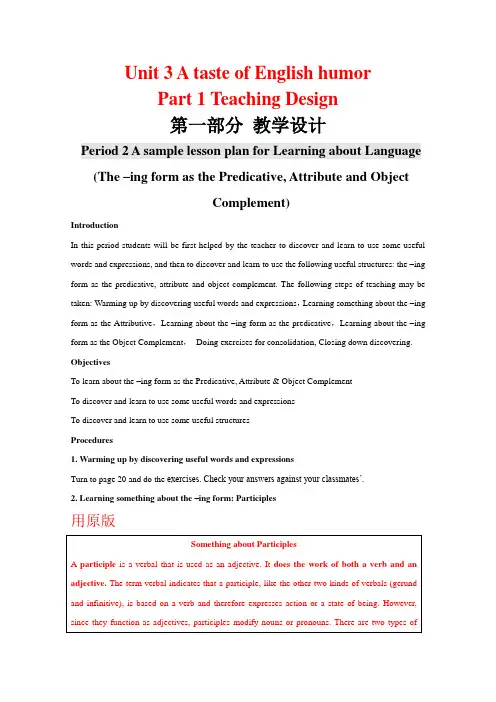
Unit 3 A taste of English humorPart 1 Teaching Design第一部分教学设计Period 2 A sample lesson plan for Learning about Language (The –ing form as the Predicative, Attribute and ObjectComplement)IntroductionIn this period students will be first helped by the teacher to discover and learn to use some useful words and expressions, and then to discover and learn to use the following useful structures: the –ing form as the predicative, attribute and object complement. The following steps of teaching may be taken: Warming up by discovering useful words and expressions,Learning something about the –ing form as the Attributive,Learning about the –ing form as the predicative,Learning about the –ing form as the Object Complement,Doing exercises for consolidation, Closing down discovering. ObjectivesTo learn about the –ing form as the Predicative, Attribute & Object ComplementTo discover and learn to use some useful words and expressionsTo discover and learn to use some useful structuresProcedures1. Warming up by discovering useful words and expressionsTurn to page 20 and do the exercises. Check your answers against your classmates’.2. Learning something about the –ing form: Participles用原版Find the participial phrases in these sentences and tell what word they modify.1. The man running slowly still finished the race.2. The boy having been scolded finally did his work.3. The teacher, having retired, could now travel widely.4. The soldier, having saluted his superior, continued on his way.5. The truck swerving and sliding hit the brick wall.Keys:1. running slowly modifies man2. having been scolded modifies boy3. having retired modifies teacher4. having saluted his superior modifies soldier5. swerving and sliding modifies truck3. Doing exercises for consolidation4. Closing down by discoveringTo end the period you are going to skim the text and the previous texts to find out all the examples containing –ing forms used as the predicative, attributive and object.Unit 3 A taste of English humorPart 1 Teaching Design第一部分教学设计Period 3 A sample lesson plan for Using Language(English jokes)IntroductionLanguage is learned to be used in and for communication. So in this period we shall have the students read, listen, write and speak in English, making use of the focused words, expressions, structures and topic ideas covered in this unit. Warming up by reading school jokes comes first to be followed by reading and underlining and doing the exercises. Guided speaking and writing will lead to the end of the period: closing down by acting.ObjectivesTo enjoy reading the paragraph of Jokes about Sherlock Holmes and Doctor WatsonTo learn to use the language by reading, listening, speaking and writingProcedures1. Warming upWarming up by reading school jokesThere are lots of jokes in English about school life. Read one to see whether you will laugh or not. 用原版2. Reading and underliningRead the paragraph and underline all the useful expressions or collocations in it. Copy them into your notebook after class as homework.3. Doing the exerciseNow you are going to do the exercise 1 on page 22.4. Guided SpeakingThink of funny stories in English and tell them to your group mates.5. Guided Writing—Learn to write jokesThere are two main parts to the structure of a joke. The first part prepares you for the laugh by telling a story which creates a sense of expectation. The second part of the joke, the punch line, provokes laughter by telling an unexpected and different story, yet one which is still compatible with the first, as in this example: “My wife just ran off with my best friend. Boy, do I miss him.” and “I had a mud pack facial done, and for three days my face loo ked much better. Then the mud fell off.” Notice the assumption that is made in both these examples. In the first, you assume the person telling the story is angry with his wife, so the punch line surprises you because he's feeling something different and unexpected. Again, in the second example, you'd most likely assume the mud had been removed, leaving the face looking better, so the punch line takes you by surprise.So, to write jokes you need to practice reading statements and writing down the assumptions you make about them. You must be able to interpret the statement (first story line) in at least two different ways in order to provide the second, different story i.e. the punch line. And what to write about? Anything that interests you. Anything you have strong opinions about.Now write down your own jokes, in English.6. Closing down by actingActing out the text is a strategy for motivating us to read out loud the text. We need oral practice and help with pronunciation and so acting out the text really helps us.To end this period, we are going to act the film by Charlie Chaplin, The Great Dictator.。
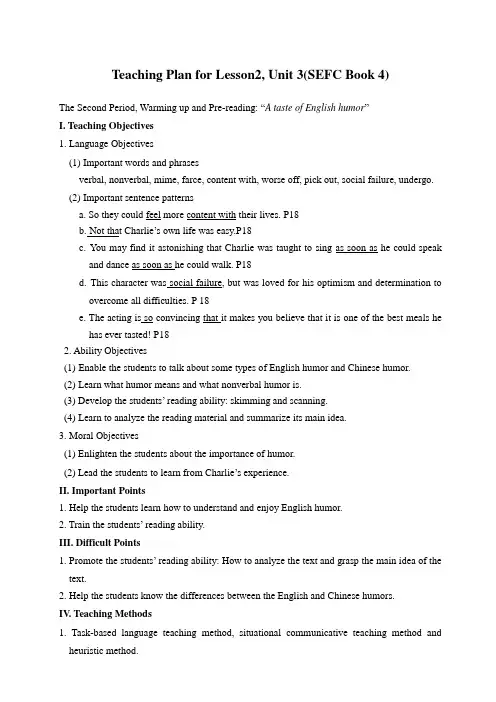
Teaching Plan for Lesson2, Unit 3(SEFC Book 4)The Second Period, Warming up and Pre-reading: “A taste of English humor”I. Teaching Objectives1. Language Objectives(1) Important words and phrasesverbal, nonverbal, mime, farce, content with, worse off, pick out, social failure, undergo.(2) Important sentence patternsa. So they could feel more content with their lives. P18b.Not that Charlie’s own life was easy.P18c.You may find it astonishing that Charlie was taught to sing as soon as he could speakand dance as soon as he could walk. P18d.This character was social failure, but was loved for his optimism and determination toovercome all difficulties. P 18e. The acting is so convincing that it makes you believe that it is one of the best meals hehas ever tasted! P182. Ability Objectives(1)Enable the students to talk about some types of English humor and Chinese humor.(2) Learn what humor means and what nonverbal humor is.(3) Develop the students’ reading ability: skimming and scanning.(4) Learn to analyze the reading material and summarize its main idea.3. Moral Objectives(1) Enlighten the students about the importance of humor.(2)Lead the students to learn from Charlie’s experience.II. Important Points1. Help the students learn how to understand and enjoy English humor.2. Train the students’ reading ability.III. Difficult Points1. Promote the students’ reading ability: How to analyze the text and grasp the main idea of the text.2. Help the students know the differences between the English and Chinese humors.IV. Teaching Methods1. Task-based language teaching method, situational communicative teaching method and heuristic method.2. Teaching Aids: a projector, a computer, blackboard, and some pictures, etc.V. Teaching ProceduresStep I Lead-in (3 mins)1.Greet the whole class as usual.2.Begin with a question to arouse the students’ attention.3.Introduce two English humors to help them get a general understanding of Englishhumor.T: Hello! At the very beginning of our today’s class, I would like to ask you a question.Why would a thief break into a shop three times? Can you guess the answer?S1: …S2: …T: Both of you did excellent jobs! Well, the story is…T: What are you laughing at? Is it the thief who makes you laugh?S: …T: The thief is humorous, right? As is known to all, humor is a word which meansmaking others laugh. If someone often makes others laugh, just as the thief does, wesay he is humorous. We call him a humorist. Today, we are going to have a wonderfultaste of English humor.Step II Warming up(10mins)1.Talk about verbal and nonverbal humors and find their differences.2.Show some pictures to the students. Ask them to guess who the typical actors in thepictures are and introduce them.3.Explain different types of humors in English and Chinese.4.Deal with the chart part on page 17.T: The English humors we just came across are called verbal jokes. Actually, there are two kinds of humors: verbal and nonverbal humor. Verbal means spoken, that is tosay we use spoken words only. However, nonverbal humor mainly relies on ourfacial expressions or gestures, instead of using words. Next, I will show you somepictures. Guess who they are.S: The first one is …T: Yes, I dare say that everybody knows him. How about the second picture?(Deal the rest in the same way)T: These are some typical actors or writers in foreign countries. There are also manymasters of verbal or nonverbal humor in china. Can you name some? I’ll showyou some pictures again. See, who are they and what are they good at? Nonverbal,mime, farce, funny tales or funny poems?S: The first picture is …T: You get it! Do you know what they are good at?S: …T: Good. I think Zhao Benshan is famous for his mime, too. The third one is Hou Baolin, who was a famous cross talk actor. But what a pity, he died. The last one is Liu Quanhe & Liu Quanli, they are good at pantomime. Can you finish the chart now?T: Sometimes English humors sound no funny at all to us. Because the sense of humor between English and Chinese is different, it is particular to each culture. So we should learn to enjoy different types of humor.The suggested answers:English humor Chinese humornonverbal Mime 刘全和、刘全利farce Sketch 陈佩斯、赵本山Verbal jokes Cross talk 侯宝林Step III Pre-reading (4 mins)1.Work in pairs to share what they know about Charlie Chaplin.2.Introduce some basic information of Charlie Chaplin to the students.3.Based on the title and the pictures in the text, ask the students to predict its content.T: Just now we shared some information of the humor masters. But we left oneperson behind. Do you still remember who he is?S: …T: Well done! What do you think of Charlie Chaplin?T: Can you name some of his masterpieces?S:…T: Excellent! His masterpieces are: The Gold Rush, Modern Times, The Little Tramp,City Night and the like.T: Today we are going to learn something about him. Welcome to our text part AMaster of Nonverbal Humor. Please look at the title and the pictures of the passageand predict its content. This passage is about:A. The story of English humorB. The films that Chaplin madeC. The humor Chaplin made in his filmD. The Gold Rush in CaliforniaStep IV Reading (15 mins)1.Skimming: ask the students to skim the whole text within 6 minutes. In thisprocedure, students should complete the following two tasks:(1)Answer the following questions.a. Why did people need cheering up?b. What was Charlie Chaplin’s childhood like?c. What was his most famous characteristic like?d. Can you give an example of a sad situation that he made it funny?e. What were his achievements?(2)Sum up the main ideas by themselves first, then discuss with group members.2.Deal with the reading part. Analyze the text paragraph after paragraph. Find out thetopic in each paragraph.(Cooperative learning)Paragraph 1: The world situation.Paragraph 2: Charlie Chaplin’s childhoodParagraph 3: His famous worksParagraph 4: An example of his workParagraph 5: His achievements3.Divide the text into 3 parts and explain why so.4.Summarize the main idea of the whole text then confirm the prediction in pre-readingpart.T: Please skim the whole text within 6 minutes, and then sum up the main idea ofeach paragraph based on the questions bellow. Then we will analyze the text.(After listening to the tape, students will have a discussion.)T: OK. I’m glad you have thought actively and had a heated discussion. Now lookat Paragraph One. What does the first paragraph mainly talk about?S1: …(Deal with the rest of the text in the same way)Step V Scanning and speaking (8 mins)1.Ask the students to scan the text for specific information about Charlie Chaplin’s lifeand career.2.Ask them to make an interview according to the reading passage.3.Ask two pairs of students to role-play their interview.4.Help them to fill the blanks in the text book then check the answers.T: Imagine that you are Charlie Chaplin, and your partner is a journalist. Make aninterview according to the reading passage. You can begin like this:J: Excuse me, I’m a repo rter from 21st Century, may I ask you some questions, Mr.Chaplin?C:...(Show on PPT)T: Good! Thanks for your amazing performance. Now try to fill the blanks in the text inone minute.Step VI Summary(4mins)1.Make a summary of the whole text.2.Discuss some questions to lead them learn from Charlie Chaplin’s perseverance,optimistic and humor. Meanwhile, help them to realize that humor is to makepeople become optimistic about everything around.T: Our text takes Charlie Chaplin as an example. It tells us what nonverbal humormeans… Then, we will have a discussion about the text. There are two questions.Discuss them with your partner.(1). Do you think his childhood helped him in his work? Why?(2). Why do you think he is so successful?T: Who would like to share your opinions?S:…T: You are right. Anyway, I hope all of you can learn from Charlie Chaplin ,and be optimistic(乐观) in spite of what difficulties come to you. I think humor is everywhere in our daily life. No matter you are rich or poor; you should live our own happy life. Step VII Homework Assignment (1 min)T: Well, so much for today. Do you have any questions about what we have learned?(Wait for the students’ response.) If there is no question, please remember your homework:1.Read the text again and think about why we divide the text into three parts.2.Finish the Comprehending and Learning about Language on P19.VI. Blackboard Design。
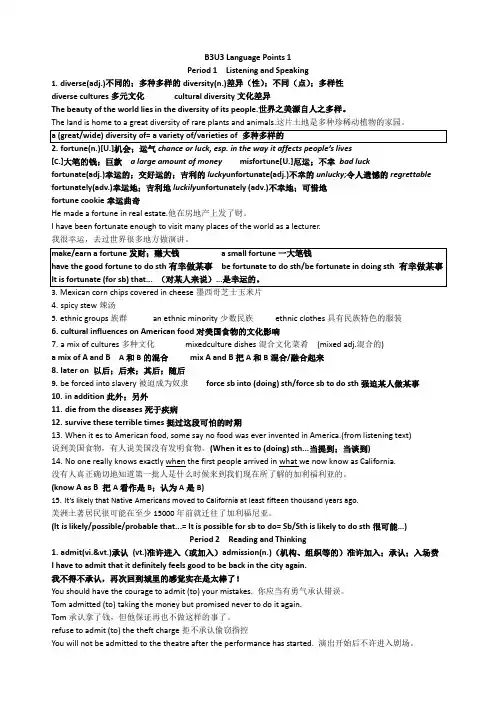
B3U3 Language Points 1Period 1 Listening and Speaking1.diverse(adj.)不同的;多种多样的diversity(n.)差异(性);不同(点);多样性diverse cultures多元文化cultural diversity文化差异The beauty of the world lies in the diversity of its people.世界之美源自人之多样。
The land is home to a great diversity of rare plants and animals.这片土地是多种珍稀动植物的家园。
机会;运气[C.]大笔的钱;巨款 a large amount of money misfortune[U.]厄运;不幸bad luckfortunate(adj.)幸运的;交好运的;吉利的lucky unfortunate(adj.)不幸的unlucky;令人遗憾的regrettable fortunately(adv.)幸运地;吉利地luckily unfortunately (adv.)不幸地;可惜地fortune cookie幸运曲奇He made a fortune in real estate.他在房地产上发了财。
I have been fortunate enough to visit many places of the world as a lecturer.我很幸运,去过世界很多地方做演讲。
3.墨西哥芝士玉米片4.spicy stew辣汤5.ethnic groups族群an ethnic minority少数民族ethnic clothes具有民族特色的服装6.cultural influences on American food对美国食物的文化影响7.a mix of cultures多种文化mixedculture dishes混合文化菜肴(mixed adj.混合的)a mix of A and B A和B的混合mix A and B把A和B混合/融合起来ter on 以后;后来;其后;随后9.be forced into slavery被迫成为奴隶force sb into (doing) sth/force sb to do sth强迫某人做某事10.in addition此外;另外11.die from the diseases死于疾病12.survive these terrible times挺过这段可怕的时期13.When it es to American food, some say no food was ever invented in America.(from listening text)说到美国食物,有人说美国没有发明食物。
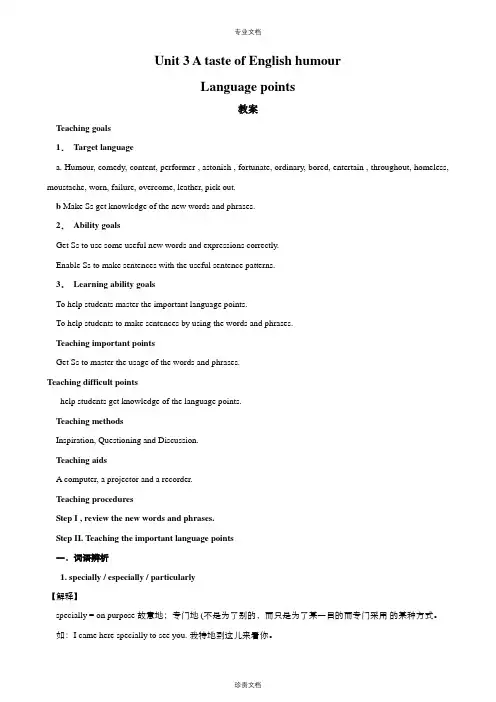
Unit 3 A taste of English humourLanguage points教案Teaching goals1.Target languagea. Humour, comedy, content, performer , astonish , fortunate, ordinary, bored, entertain , throughout, homeless, moustache, worn, failure, overcome, leather, pick out.b Make Ss get knowledge of the new words and phrases.2.Ability goalsGet Ss to use some useful new words and expressions correctly.Enable Ss to make sentences with the useful sentence patterns.3.Learning ability goalsTo help students master the important language points.To help students to make sentences by using the words and phrases.Teaching important pointsGet Ss to master the usage of the words and phrases.Teaching difficult pointshelp students get knowledge of the language points.Teaching methodsInspiration, Questioning and Discussion.Teaching aidsA computer, a projector and a recorder.Teaching proceduresStep I , review the new words and phrases.Step II. Teaching the important language points一.词语辨析1. specially / especially / particularly【解释】specially = on purpose故意地;专门地 (不是为了别的,而只是为了某一目的而专门采用的某种方式。
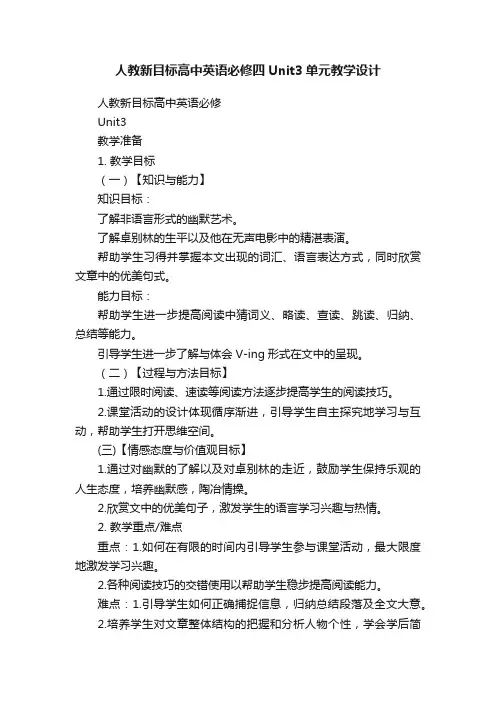
人教新目标高中英语必修四Unit3单元教学设计人教新目标高中英语必修Unit3教学准备1. 教学目标(一)【知识与能力】知识目标:了解非语言形式的幽默艺术。
了解卓别林的生平以及他在无声电影中的精湛表演。
帮助学生习得并掌握本文出现的词汇、语言表达方式,同时欣赏文章中的优美句式。
能力目标:帮助学生进一步提高阅读中猜词义、略读、查读、跳读、归纳、总结等能力。
引导学生进一步了解与体会V-ing形式在文中的呈现。
(二)【过程与方法目标】1.通过限时阅读、速读等阅读方法逐步提高学生的阅读技巧。
2.课堂活动的设计体现循序渐进,引导学生自主探究地学习与互动,帮助学生打开思维空间。
(三)【情感态度与价值观目标】1.通过对幽默的了解以及对卓别林的走近,鼓励学生保持乐观的人生态度,培养幽默感,陶冶情操。
2.欣赏文中的优美句子,激发学生的语言学习兴趣与热情。
2. 教学重点/难点重点:1.如何在有限的时间内引导学生参与课堂活动,最大限度地激发学习兴趣。
2.各种阅读技巧的交错使用以帮助学生稳步提高阅读能力。
难点:1.引导学生如何正确捕捉信息,归纳总结段落及全文大意。
2.培养学生对文章整体结构的把握和分析人物个性,学会学后简介人物。
3. 教学用具4. 标签教学过程Step1: Lead in 2′利用问题为课文讲述埋下伏笔,用卓别林的图片进行导入,并用brainstorming方式发散学生思维,围绕与幽默相关的词汇展开,卓别林正是由于这些与众不同的因素获得成功,从而成功导入本课主题——卓别林。
【设计意图】利用查理卓别林的生活照和剧照以及头脑风暴的方式既活跃了课堂气氛,又激发了学生用英语表达的欲望,达到寓教于乐的目的,同时也为下一步阅读课文做好铺垫。
读中阶段,既是阅读课文教学的主要环节,又是学生阅读实践的重点内容,这部分教学中将着重训练学生的阅读技巧和策略。
包括:速读(细读和寻读)、细读。
Step2: Fast reading第一环节:skimming (略读) 2′让学生快速阅读课文,并找出文章大意及文章中提及的一部电影。
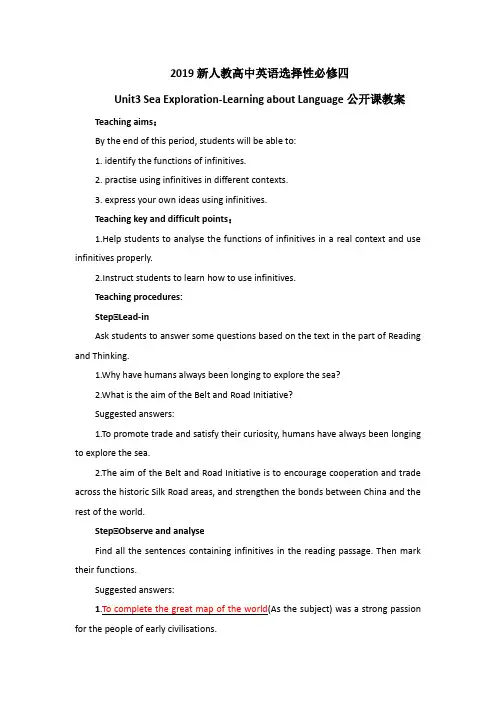
2019新人教高中英语选择性必修四Unit3 Sea Exploration-Learning about Language公开课教案Teaching aims:By the end of this period, students will be able to:1. identify the functions of infinitives.2. practise using infinitives in different contexts.3. express your own ideas using infinitives.Teaching key and difficult points:1.Help students to analyse the functions of infinitives in a real context and use infinitives properly.2.Instruct students to learn how to use infinitives.Teaching procedures:StepⅠLead-inAsk students to answer some questions based on the text in the part of Reading and Thinking.1.Why have humans always been longing to explore the sea?2.What is the aim of the Belt and Road Initiative?Suggested answers:1.To promote trade and satisfy their curiosity, humans have always been longing to explore the sea.2.The aim of the Belt and Road Initiative is to encourage cooperation and trade across the historic Silk Road areas, and strengthen the bonds between China and the rest of the world.StepⅠObserve and analyseFind all the sentences containing infinitives in the reading passage. Then mark their functions.Suggested answers:1.To complete the great map of the world(As the subject) was a strong passion for the people of early civilisations.2.Marco Polo’s tales inspired European explorers to search for sea routes (As the object complement) from west to east.3.Here, merchants from China and many other places met to negotiate trade deals (As the adverbial), which also led to more awareness of each other’s cultures.4.To reach out across the sea (As the subject) remains a strong desire today.5.The aim of this initiative is to encourage cooperation and trade(As the predicative) across the historic Silk Road areas, and strengthen the bonds between China and the rest of the world.6.Trading has grown greatly in recent years, and will continue to do so (As the object) in years to come.7.In recent years,China has joined other nations on several expeditions to explore the Arctic(As the attributive).8.From a scientific point of view, there is an urgent need to study the Arctic(As the attributive) in order to understand climate change and its effects.9.... the need to trade(As the attributive) and the desire to enhance relationships(As the attributive) will drive China to reach out (As the object complement) across the sea far into the future.StepⅠ Practise using the infinitiveActivity1Join the words to make sentences using infinitives.Then decide the function of each infinitive.1.He/encouraged me/participate in the surfing competition.2.The storm/seems/be getting closer.3.Magellan/was the first person/sail around the world.4.The UN peacekeeping force/aims/maintain peace and prevent armed conflicts.5.The crowd/stood/applaud/scientists/for their important ocean research work.6.It is a good idea/tax/plastic bottles/so that people use them less.7.The Jiaolong manned submersible/is said/be able/reach 7 km underwater.8.It remains/be seen/whether or not his capsule can work.Suggested answers:1.He encouraged me to participate in the surfing competition. (OC)2.The storm seems to be getting closer. (P)3.Magellan was the first person to sail around the world. (Attr)4.The UN peacekeeping force aims to maintain peace and prevent armed conflicts. (O)5.The crowd stood to applaud scientists for their important ocean research work. (Ad)6.It is a good idea to tax plastic bottles so that people use them less. (S)7.The Jiaolong manned submersible is said to be able to reach 7 km underwater. (O;O)8.It remains to be seen whether or not his capsule can work. (P)Activity2Read the beginning of The Little Mermaid and use the proper forms of the verbs in brackets to fill in the blanks.Far out in the ocean,where the water is as clear as glass,lives the Sea King. The ocean is too deep (measure).We may imagine there is nothing except yellow sand under the sea,but actually it is not rare(see) the most unique flowers and plants(dance) in the fast-moving water.In the deepest spot of all stands the Sea King’s castle,which has walls of coral and a roof(form) of beautiful shells.The mother of the king,a wise woman who is proud(be) born into the royal family,takes care of his six daughters.Among the six sea-princesses,the youngest is the prettiest.Although she has delicate skin like a rose-leaf and eyes as blue as the deepest sea,she has no feet but a fish tail just like her sisters.The most common way for the princesses(play) all day long is (swim) in the halls of the castle or among the flowers growing out of the walls,feeding and touching the fish(swim) up to their hands through the windows.They seem(not worry) about anything,except for theyoungest,who...Suggested answers:to measure; to see; dancing; formed; to have been;to play; swimming/to swim; swimming; not to worryActivity3Read the beginning of The Little Mermaid once again and continue to write what will happen next.They seem not to worry about anything except for the youngest, who___________________Suggested answers:They seem not to worry about anything except for the youngest, who wants to see what life is like on land. She swims all the way to the surface and sees a large ship. It travels towards her at great speed and terrifies her. She swims below the surface of the water and just manages to swim away from the big ship. She now realises that it is a scary world outside of the ocean, and she decides to stay with her family and friends under the sea.Activity4Complete the news report below with the appropriate forms of the verbs in brackets.Across northern Africa, the desert is steadily growing. Dry lands are spreading. But a bold project known as the Great Green Wall aims 1.(stop) the growth of the desert. The ambitious program includes plans 2.(help) protect and maintain resources and fight poverty.Farmers are learning 3.(care) for their land and use water wisely. They are also planting millions of trees and crops. The Great Green Wall would cover 4.area more than 4,000 miles wide. The program receives support from the United Nations, the World Bank and other groups.The Great Green Wall’s trees provide a barrier 5.desert winds and help hold moisture in the air and soil, allowing crops 6.(grow).More resources will bring more jobs. “The goal is to create sustainable land management,” said Nora Berrahmouni, a forestry officer 7.works with the Food and Agriculture Organisation of the United Nations.Trees and crops have been planted in Senegal and Niger. An 8.(add) benefit of the Great Green Wall is 9.countries in the region are sharing information about which programs work and which don’t. Now, along with trees, 10. (idea) are taking root.Suggested answers:1.to stop2.to help3.to care4.an5.against6.to grow7.who/that8.added9.that10.ideasStepⅠLanguage useAsk students to write a paragraph with any topic using infinitives and v.-ing form.Suggested answers:Recently, I have managed to become a more active learner. When I am reading a book or listening to my teacher, I try to forget what I have learnt before or what I think about the book or the person giving me the information and practise concentrating on the information itself. At the beginning, it was difficult to do so and I couldn’t help questioning the ideas I was reading or hearing. But now I have learnt to avoid listening to my inner voice all the time and sometimes I even argue with it. On the other hand, I also attempt to ask as many questions as I can. I have noticed that the answers to the questions have really helped me understand the topic a lot better.StepⅠ PracticeⅠ.Rewrite the underlined parts using infinitives.Suggested answers:1.to help you keep track of2.to record your steps, speed and distance3.to enable you to stay hands-free4.to make it comfortable to wearⅠ.单句语法填空1.Fascinated by the structural beauty of the Forbidden City as a painter, she is equally interested (learn) more about Chinese philosophy.2.Von Wong hopes that his work will also help pressure big companies (reduce) their plastic footprint.lions of acres of wetlands were dried (feed) and house the ever-increasing populations, greatly reducing waterfowl habitat.4.Our aim was(see) if we could live, in some way, like real Parisians.Suggested answers:1.to learn2.to reduce3.to feed4.to see。

Unit3 Language points 名师教学设计设计意图This is the third teaching period of this unit. The teacher can first offer chances to students to review what they learned last period. Then lead into the new lesson.The emphasis of this period will be placed on the important words, expressions and sentence patterns in the reading text. In order to make students understand these points, we can first get students to find those words and phrases in their dictionaries or reference books, then offer some exercises to make students master their usage and give some explanations about them.At the end of the class, the teacher can make students do more exercises and organize a short passage for consolidation. By doing so, the students can learn and use these important language points well.教学目标1. Get students to grasp the usage of such words and expressions as astonish, entertain, failure, convince, particular, feel/be content with, badly off, pick out, etc.2. Enable students to master the following patterns.(1) As Victor Hugo once said, “Laughter is the sun that drives winter from the human face”.(2) Then he picks out the lace of the shoe and eats it as if it were spaghetti.教学过程Step 1 Revision:课文再现A MASTER OF NONVERBAL HUMOURCharlie was born in a poor family. You may find it (1) _____ (惊奇的) that Charlie was taught to sing as soon as he could speak and dance as soon as he could walk. (2) _____ (不幸的是) his father died, (3) _____ (使得) the family even (4) _____ _____ (更贫穷), so Charlie spent his childhood (5) _____ _____ (照顾) his sick mother and his brother. By his teens, Charlie had become one of the most popular child actors in England. He could mime and act the fool (6) _____ _____ _____ _____ (做日常的事物). His subtle acting made everything (7) _____ (滑稽可笑).(8) _____ _____ _____ _____ (随着时间的流逝), he became known throughout the world as the little tramp. This character was a social (9) _____ (失败者) but was loved for his optimism and determination to (10) _____ _____ _____ (战胜所有困难).Here is an example from one of his most famous films, The Gold Rush. He and his friend are so hungry that the little tramp tries boiling one of his leather shoes for dinner. Then he (11) _____ _____ (切) the leather top of the shoe and (12) _____ _____ _____ _____ (和同伴分享这只鞋) the other fellow. Charlie (13) _____ _____ (挑出) the lace of the shoe and eats it as if it were spaghetti. He eats each mouthful with great enjoyment. The acting is so (14) _____ (有说服力的) that it makes you believe that it is one of the best meals he has ever tasted.Charlie Chaplin wrote, (15) _____ (指导) and produced the films he (16) _____ _____ (主演). In 1972 he was given a special Oscar for his (17) _____ (杰出的) work in films. He is loved and remembered as a great actor who could (18) _____ (鼓舞) people with great (19) _____ (信心).Suggested answers:(1) astonishing (2) Unfortunately (3) leaving (4) worse off (5) looking after (6) doing ordinary everyday tasks (7) entertaining (8) As time went by (9) failure (10) overcome all difficulties (11) cuts off (12) shares the shoe with (13) picks out (14) convincing (15) directed (16) starred in (17) outstanding (18) inspire (19) confidence Step 2 Words and expressions to learn1. …up to now nobody has been able to do this better than Charlie Chaplin. ……关于这一点,直到今天也没有人能比查理·卓别林做得更好。


Unit 3 A taste of English humourLanguage points教案Teaching goals1.Target languagea. Humour, comedy, content, performer , astonish , fortunate, ordinary, bored, entertain , throughout, homeless, moustache, worn, failure, overcome, leather, pick out.b. Make a list of the language points and phrases.2.Ability goalsGet Ss to master the usage of the new words and phrases.Enable Ss to make sentences with the useful sentence patterns.3.Learning ability goalsTo help students master the important language points.To help students to make sentences by using the words and phrases.Teaching important pointsGet Ss to master the usage of the words and phrases.Teaching difficult pointshelp students get knowledge of the language points.Teaching methodsInspiration, Questioning and Discussion.Teaching aidsA computer, a projector and a recorder.Teaching proceduresStep I, review the new words and phrases.Step II. Teaching the important language points重点词汇1、cruel adj.残酷的;令人痛苦的①He is cruel to animals.他对动物很残酷。
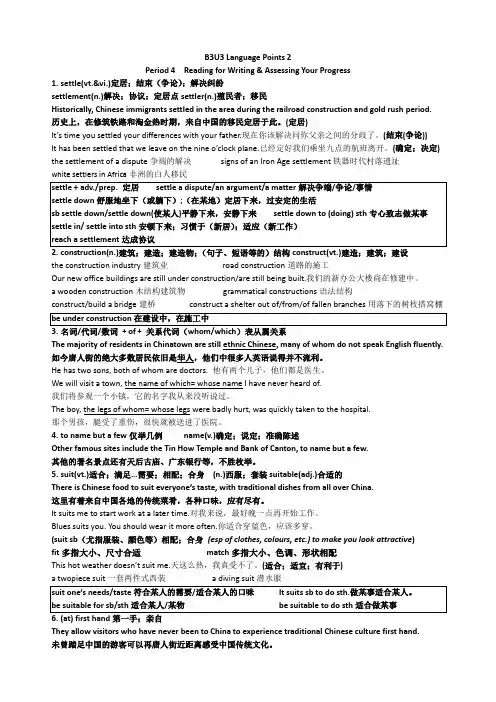
B3U3 Language Points 2Period 4 Reading for Writing & Assessing Your Progress1.settle(vt.&vi.)定居;结束(争论);解决纠纷settlement(n.)解决;协议;定居点settler(n.)殖民者;移民Historically, Chinese immigrants settled in the area during the railroad construction and gold rush period.历史上,在修筑铁路和淘金热时期,来自中国的移民定居于此。
(定居)It’s time you settled your differences with your father.现在你该解决同你父亲之间的分歧了。
(结束(争论))It has been settled that we leave on the nine o’clock plane.已经定好我们乘坐九点的航班离开。
(确定;决定) the settlement of a dispute争端的解决signs of an Iron Age settlement铁器时代村落遗址white settlers in Africa非洲的白人移民2.construction(n.)建筑;建造;建造物;(句子、短语等的)结构construct(vt.)建造;建筑;建设the construction industry建筑业road construction道路的施工Our new office buildings are still under construction/are still being built.我们的新办公大楼尚在修建中。
a wooden construction木结构建筑物grammatical constructions语法结构construct/build a bridge建桥construct a shelter out of/from/of fallen branches用落下的树枝搭窝棚名词/代词/数词+ + 关系代词()表从属关系The majority of residents in Chinatown are still ethnic Chinese, many of whom do not speak English fluently.如今唐人街的绝大多数居民依旧是华人,他们中很多人英语说得并不流利。

B2U3Language Points 1Period 1 Listening and Speaking1.chat (vi./n.) 聊天;闲聊chattedchattedchattingchat online (adv.) 在线聊天I often chat about old days with my friends on the phone in my spare time.= I often have a chat with my friends about old days on the phone in my spare time.在闲暇时我经常和朋友在里聊聊过去的时光。
(chat with sb about sth = have a chat with sb about sth 与某人闲聊某事)a chat room(互联网上的)聊天室 a group chat 群聊词义关联:talk to/with sb about sth 说话;讲话;谈话speak to sb about sth 谈;谈话;交谈discuss sth with sb 讨论;谈论;商量gossip about sb/sth 传播流言蜚语;说三道四municate with sb/sth 与...交流2.stream(vt.)流播(不用直接在互联网上播放音视频);流出(vi.)流动(n.)小河;溪流stream(vt.) movies and music 流播电影和音乐a stream 一条小河The exhibition has a steady stream of visitors. 参观展览的人络绎不绝。
(a stream of sth/sb (人)流;(车)流)Tears streamed down his face. 泪水顺着他的脸往下流。
Water streamed out of the pipe. 水从水管里流出来。
高中英语必修四unit3教案必修是新课程标准改革中的一个名词,是课程结构调整中的一种课程类型。
和必修相对的是选修。
依据规定必需学的,尤指取得学位或到达毕业要求必需学的必修课必修和选修,这是从课程方案中对课程实施的要求来区分的两种,下面是我为大家整理的高中英语必修四unit3教案5篇,期望大家能有所收获!高中英语必修四unit3教案1教学预备教学目标1. Ss will be able to master the following useful new words and expressions.well,smelly,pond,burst,canal,steam,dirt,injure,brick,dam,useless,steel,sh ock,rescue,quake,electricity,army,shelter,fresh, organize, bury, at an end, dig out, coal mine, in ruins2. Ss will be able to know the basic knowledge about Earthquake教学重难点1. The usages of some words and expressions.2. How to train the students’ reading ability in learning the text.教学工具课件教学过程Step I lead-inLet students see a short video and answer the questions1.What happened in the video Earthquakes2.How do you feel seeing the plots(情节) Students’ discussion. Step II Fast reading1. What is the passage mainly about In Tangshan ,earthquakes happened on July 28th 19762. Skim the text and answer the questionsThe type of writing (写作体裁)Narrative writingTopic sentence of Paragraph 1Sentence 1Topic sentence of Paragraph 2Sentence 2Topic sentence of Paragraph 3Sentence 1Topic sentence of Paragraph 4Sentence 1Step III Detailed readingAsk students to read the text carefully and answer the questionsTask1: What were the nature signs of the coming earthquake(选择)Para 11.Water in well( G )2. Well walls(D )3.Chickens pigs(F ) 4 .Mice (A)5.Fish(E )6. Bright lights( B)7. Water pipes(C )A. Ran out of fieldsB. in the skyC. Cracked and burstD. Deep cracksE. Jumped out of pondsF. Too nervous to eatG. Rose and fell, fell and roseTask 2 Fill in the blanksMain IdeaDetailsDamage caused byearthquakePara 2-3At _____ am, the __________ earthquake of the 20th century began . _______ burst from holes in the ground.Hard hills of the rock became rivers of ____.________ covered the ground like red autumn leaves.Two _______ and most of the bridges fell.The railway tracks were now _________pieces of _______.______ now filled the wells instead of water.Water,food,and ______________ were hard to get.The reconstruction(重建) after the earthquakePara 41. The army _____________2. Workers ____________for survivors.3._____________was taken to the city.Details:1. At 3:42 am, the greatest earthquake of the 20th century began.2. Steam burst from holes in the ground.3. Hard hills of the rock became rivers of dirt.4. Bricks covered the ground like red autumn leaves.5. Two dams and most of the bridges fell.6. The railway tracks were now useless pieces of steel.7. Sand now filled the wells instead of water.8. Water, food, and electricity were hard to get.Step IV consolidation (当堂稳固)Let students fill the blanks according to the passageStrange things were happening in the countryside of northeast Hebei. For three days the water in the village wells kept rising and1_________(fall). Farmers noticed that the well walls had deep cracks 2___________ them. A smelly gas came out of the cracks. In3_________farmyards, the chickens and even the pigs were too nervous 4__________(eat). 5_________(mouse) ran out of the fields looking for places 6________(hide). Fish jumped outOf their bowls and ponds. At about 3 am on July 28,1976, some people saw bright lights 7_________ the sky. The sound of planes could 8________(hear) outside the city of Tangshan even 9_________ no planes were in the sky.In the city, the water pipes in some buildings cracked and burst. But the one million people of the city, ________thought little of these events, were asleep as usual that night.1 falling2 in3 the4 to eat5 mice6 to hide 7in 8 be heard 9when 10 who这局部目的是让同学进一步稳固课文的内容。
XB1U3 Language Points 1Period 1 Reading and Thinking1.buffet(vt.)连续猛击;打来打去(n.)自助餐②cloth(n.)(一块)布;织物;布料I wake up to(因……而醒来;意识到,认识到=realise)the sound of the wind buffeting(连续猛击)the cloth((一块)布;织物;布料)of my tent.风噼里啪啦地拍打着我的帐篷的布,我在这声响中醒来。
He hasn’t yet woken up to the seriousness of the situation.他还没认识到形势的严重性。
be buffeted by the wind被风吹得左右摇摆woolen/cotton cloth毛料/棉布料([U.]) a damp cloth一块湿布([C.])2.edge(n.)边;边缘;边线;刀刃(vt.&vi.)(使)徐徐移动;给……加边Checking my watch, I see that it is 7:30 a.m. I leave my tent and walk over the mountain edge(走向山边).我看了下手表,现在是上午7点30分。
我迈出帐篷,走向山边。
Gin spent five months exploring the most remote corners of this area, which sits on the edge of the Amazon rainforest. Gin花了五个月的时间探索这一地区最偏远的角落,它位于亚马逊雨林的边缘。
They had brought the country to the edge of disaster.他们使国家濒临灾难。
The game had the crowd on the edge of their seats.这场比赛使观众兴奋不已。
Unit 3 A taste of English humourUsing language教案学习目标: Learn the new words and expressions教学重点:The usage of important words and expressions.Steps :(教学步骤)Step 1 Have a check about the homework in the last lesson.(检查上节课的作业)Step 2:Read the words and expressions on page 97-98(读熟97-98页Unit3的新单词和短语,注意发音,以及单词的词性)Step3:Learn the following words and expressions by yourselves.(自学下面的内容)1. humour n. 幽默humourous adj. 幽默的a sense of humour 幽默感2. brighten 使愉快blacken 变黑darken -en 动词后缀3. depressed 意志消沉的depressing令人沮丧的depression n 抑郁消沉She felt depressed about the future 他感到前途无望Looking for a job these days can be very depressing.如今求职有时让人非常沮丧She suffered a severe depression after losing her job.她失业后患了严重的抑郁症4. content n 内容adj. 满意的满足的the content of the book 书的内容be/feel content with 对…满意be content to do 甘愿做某事He doesn’t want more money__ he is content with what he has.他不想要更多的钱,他满足于现状Einstein was content to spend most of his time alone.爱因斯坦甘愿独自一人度过大部分时间。
Book 4 Unit 3 A taste of EnglishhumourPeriod One Explanations of new words and phrasesI.Words. I1. content adj.表示或感到满意或满足的; 心满意足的:_______________vt. 1) We should never content ourselves with book knowledge oniy. Adj. 1) He is content to stay in his present job.2) Don’t be content with such a small success.n. 1) The drawer had been emptied of its contents.2) The content of your essay is excellent, but it's not very well expressed.3) We can swim in the river to our heart’s content.2. inspire adj. 有创作力的,受灵感启示的:__________ 有创作力的诗人______________vt. 1) Our first sight of the dingy little hotel did not inspire us withmuch confidence.2) This inspired in us a love for learning.3) The teacher inspired us to work harder.4) The teacher inspired us to great efforts.3. entertain adj使人愉快的; 有趣的.________n. 宴客; 招待; 款待; 娱乐____________n.(娱乐节目的)表演者; (尤指)艺人_____________________vt.1) He entertained us for hours with his stories and jokes.2) I usually entertain friends to dinner on Sundays.拓展:entertaining adj. 使人愉快的,有趣:his entertaining silent movies他那逗乐的无声电影,an entertaining story/guess一个有趣的故事/客人。
Topic Revision of Book 4 Unit 3 Type RevisionTeaching aims:知识与技能The important lang uage points of this unit过程与方法Review and practice情感态度与价值观Laughter is the sun that drives winter from the human face.Key point s The important la nguage p oints of this unit.Teachingaids:multimediaDifficult points The –ing form as the predicative, a ttribute and objectcomplement.Teaching ProceduresStep I. GreetingStep II. Review the key words and expressions of this unit.1. Ask Ss to write down the key words and expr essions according to their Chinesemeanings.2. Do some related exercises to consolidate the usages of these important languagepoints.Step Ⅲ. Review the grammar focus of this unit.A sk Ss to fill in these blanks and the teacher explain the usages of the –ing form asthe predicative, attribute and object complement.1) _______________(clean) women in big cities usually get paid by the hour.2) The man _____________ (wear) a sa d look said, "I've lost my wallet."3) All of us watched the hunter _________(bring) down the dangerous bear.4) When he woke up, he found h imself ____________ (lie) in hospital.5) The students came into the classroom_____________ (follow) th e teacher.6) His hobby is_____________(c ollect) wine bottles.7) The report is ve ry_________________(encourage).Step IV. Practice1. Grammar filling2. Cloze testStep V. Homework:1.Review the key words and expressions of Unit2.2.English Weekly (Reading Comprehe nsion)。
Book 4 Unit 3 A taste of English humourPeriod One Explanations of new words and phrasesI.Words. I1. content adj.表示或感到满意或满足的; 心满意足的:_______________vt. 1) We should never content ourselves with book knowledge oniy.Adj. 1) He is content to stay in his present job.2) Don’t be content with such a small success.n. 1) The drawer had been emptied of its contents.2) The content of your essay is excellent, but it's not very well expressed.3) We can swim in the river to our heart’s content.2. inspire adj. 有创作力的,受灵感启示的:__________ 有创作力的诗人______________vt. 1) Our first sight of the dingy little hotel did not inspire us with much confidence.2) This inspired in us a love for learning.3) The teacher inspired us to work harder.4) The teacher inspired us to great efforts.3. entertain adj使人愉快的; 有趣的.________n. 宴客; 招待; 款待; 娱乐____________n.(娱乐节目的)表演者; (尤指)艺人_____________________vt.1) He entertained us for hours with his stories and jokes.2) I usually entertain friends to dinner on Sundays.拓展:entertaining adj. 使人愉快的,有趣:his entertaining silent movies他那逗乐的无声电影,an entertaining story/guess一个有趣的故事/客人。
4. direct n. 方向,指导____________主管,导演______________说明书_______________vt. 1) Can you direct me to the station?2) The owners directed that the factory be closed.3) The officer directed them to advance.【辨析】direct/directlydirect. adv 1) 中途不停地; 径直地; 笔直地2) 亲自地; 直接地directly. adv 1) 径直地; 直接地; 坦率地; 直爽地2) 立即; 马上Come in directly3) conj as soon as 一俟; 一...就...:He took a direct flight to New York. 他直飞纽约。
We flew direct from London to New York. 我们直接从伦敦飞到纽约5. sense n. 官能,感觉,理性vt. 感觉到,理解n. 1) He is far from any sense of responsibility.2) There is no sense in getting upset about it .3) It doesn't make sense to buy that expensive coat when these cheaper ones are just as good. 4) Can you make sense of this poem?5) She came to senses in hospital.6)Your brother has a good sense of humor. 你兄弟很有幽默感。
7)The dog sensed that I was afraid. 这只狗感觉到我害怕了。
6. astonish vt 使惊讶(= surprise sb. greatly)The earthquake astonished the whole country. 这次地震震惊了全国。
辨析:astonishing adj.令人震惊的;astonished adj.感到惊呀的7. particular 非一般的,特别的,特殊的He left for no particular reason. 他无缘无故就走了。
To Jane, her diary is a particular friend. 对简来说,日记是她的特殊朋友。
搭配:in particular =especially特别是8. throughout prep. 遍及, 贯穿adv. 到处, 始终, 全部It rained throughout the night. 雨下了一整夜。
I watched the film and cried throughout. 我看那个电影时从头哭到尾。
9. failure n.失败(不可数);失败的经历,失败的人或事(可数)Failure is the mother of success. 失败是成功之母。
I became successful after many failures. 在多次失败后,我终于成功了。
She was a failure as a manager. 她是一个不称职的经理。
10. overcome v. 克服,战胜(defeat);找到解决……的办法)He has overcome the bad habit of smoking. 他改掉了吸烟的坏习惯。
After hours of hard working, they overcame the difficulty. 经过几个小时的努力,他们终于把这难题解决了。
搭配:be overcome with /by因……不能自持He was overcome by the heat. 他热得受不了。
11. fortunate adj. 幸运的,交好运的(=lucky)He is a fortunate man (=a lucky dog). 他是个幸运的人。
I was fortunate to have a good teacher. 我很幸运,有位好老师。
派生:fortunately adv.幸好(=luckily常置于句首);unfortunate adj. 不幸的(=unlucky) ;unfortunately adv. 不幸的是(=unluckily);fortune n. 运气,财富,巨款12. mouthful n. 一口, 满口I’m so full I couldn’t eat another mouthful. 我吃得太饱了,一口也不能多吃了。
He took a mouthful of fresh air. 他吸一口新鲜空气。
注:不要因以ful结尾而误以为是形容词,这类名词还有handful(一把)等。
13. outstanding adj. 突出的, 杰出的,显著的She is an outstanding actress. 她是一个杰出的演员。
He has many outstanding gifts. 他多才多艺。
14. sense n. 官能,感觉,理性vt. 感觉到,理解She has no sense of time. 她没有时间观念。
He has a good sense of smell. 他的嗅觉很灵敏。
Your brother has a good sense of humor. 你兄弟很有幽默感。
The dog sensed that I was afraid. 这只狗感觉到我害怕了。
Ⅱ. Phrases.1. be content(=satisfied) with…/to do…对……感到满意/满足的He was content with his work. 他对自己的工作很满意。
The old man seems content to live here. 这个老人似乎很乐意住在这里。
注:content是表语形容词,若需作定语,可用contented,如a contented person /smile心满意足的人/微笑。
2. badly off 穷的,缺少的,处境差比较级:worse off境况更差,更穷困反义词:well off富裕,处境好(比较级:better off)I am quite badly off recently. 最近我经济上很拮据。
His health is worse off than before. 他的身体比以前更糟糕。
He is quite well off, I hear. 我听说他相当富裕。
He is much better off than I am. 他的日子比我宽裕得多。
注:well-to-do life或a better-off life小康生活;well-off family小康之家3. pick out挑选出,认出,弄懂Please pick out the books that you’d like t o read. 请把你想看的书选出来。
Can you pick out your sister in this crowd? 你能在这人群中认出你姐姐来吗?The box was so dirty that we couldn’t pick out the directions on the label. 盒子太脏,我们看不清标签上的说明。
真题:This picture was taken a long time ago. I wonder if you can ________my father. (湖北)A. find outB. pick outC. look outD. speak out解析:表示从人群中“辨认出”,用pick out,故选B。